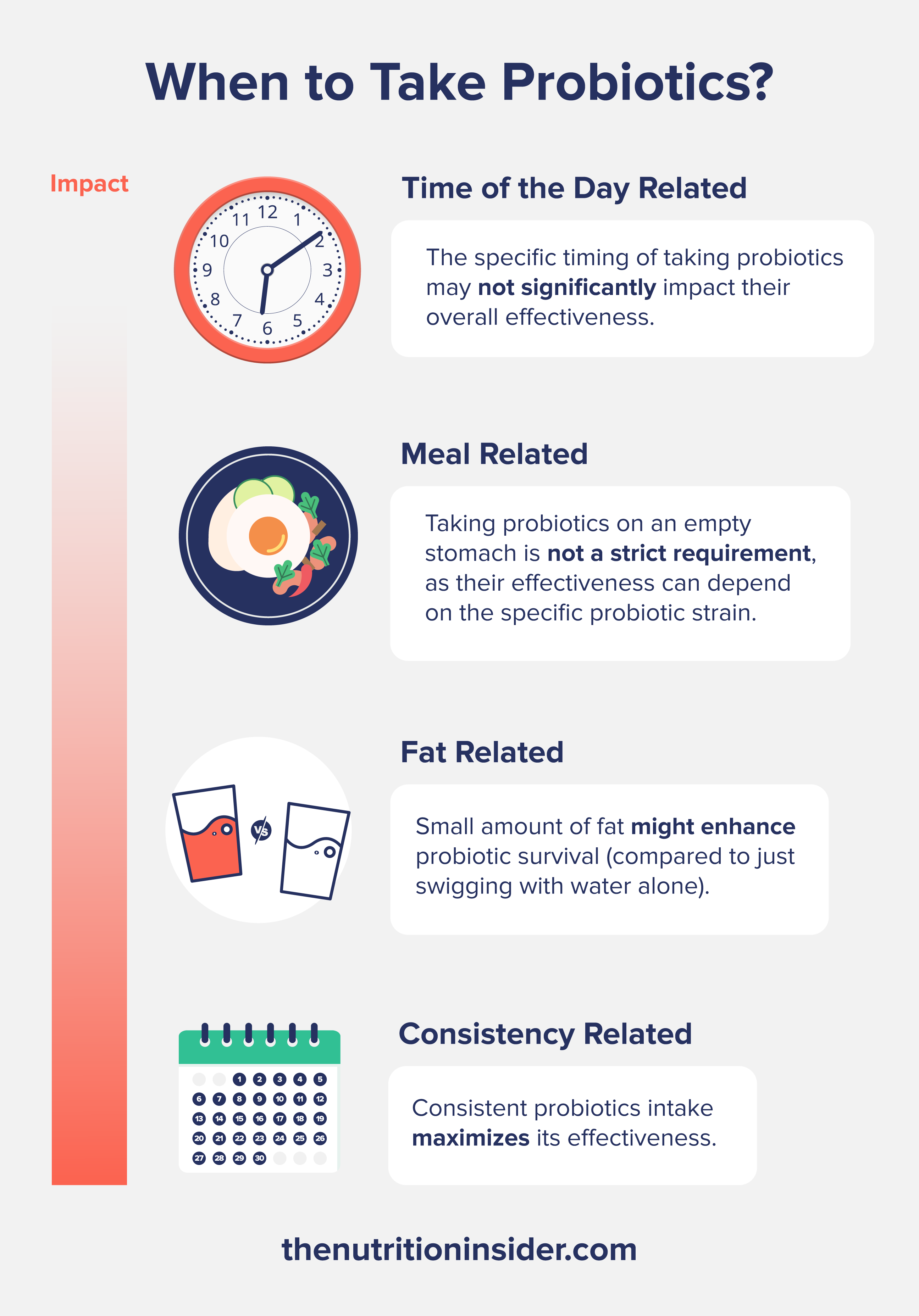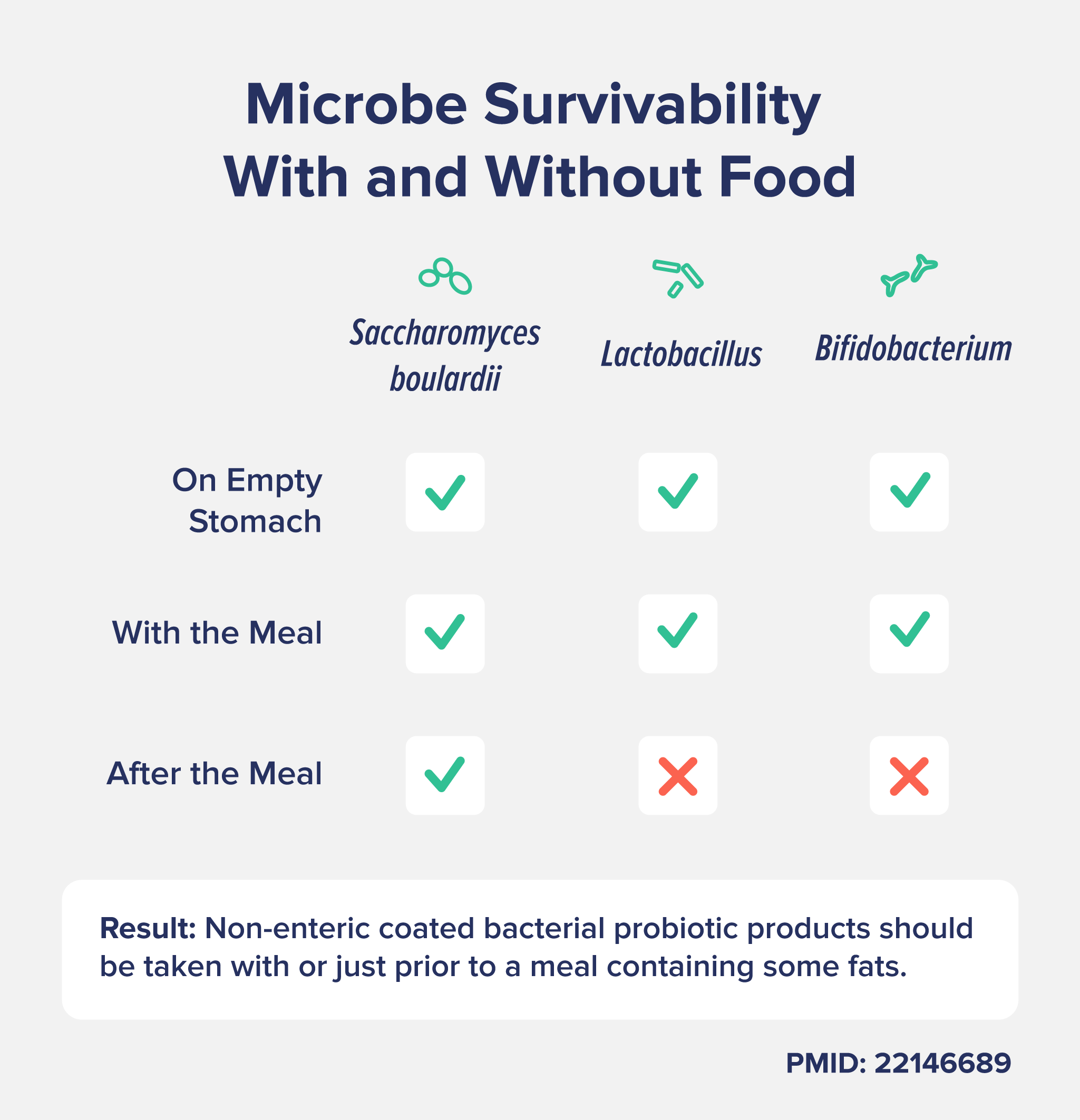Talk to a Registered Dietitian and use INSIDER20 for 20% off!
Talk to a real Dietitian for only $99: Schedule Now
This post contains links through which we may earn a small commission should you make a purchase from a brand. This in no way affects our ability to objectively critique the products and brands we review.
Evidence Based Research To fulfill our commitment to bringing our audience accurate and insightful content, our expert writers and medical reviewers rely on carefully curated research.
Read Our Editorial Policy
Many people aiming to improve their gut health or overall wellness have added a probiotic into their supplement routine—and with good reason. Having beneficial bugs in your gut has been found to support everything from mood and metabolism to inflammation and immunity.
But is there an ideal time to take probiotics? Is morning, afternoon, or evening best? And on an empty stomach or filled with food?
Not to worry; we’ve got you covered. Keep reading to find out the answers to these questions and more.
But if you’re just going to skip to the end, here’s the quick answer: some research suggests that taking probiotics on an empty stomach or with a small bit of food is best—but it matters most that you take your probiotics at a time you can reliably remember, as consistency is key.
The best time to take probiotics seems like a straightforward question—but, unfortunately, it’s a bit nuanced.
Just a quick Google search of this question will elicit vastly different answers—some experts claim that in the morning, without food, is best; others state that food is necessary for the microbes to survive.
What gives? Let’s take a closer look at what the science says.

Some brands recommend taking probiotics on an empty stomach, while others advise taking them with food.
Most clinical trials with probiotics do not look at supplement timing, suggesting that scientists do not consider this an important factor when taking probiotics.
According to popular probiotic brand Seed Health, “The time of day is less important than understanding that you ideally want to take a probiotic on an empty stomach (and at least 15-45 minutes before a meal, or 2-3 hours after eating). For most people, that means first thing in the morning or right before bed.”
The bottom line: Unless specifically stated by the probiotic manufacturers, the best time to take a probiotic is when you’ll remember to take it, as consistency is key when it comes to probiotics.
Research implies that the amount of food in your stomach is more important than the time of day you take a probiotic supplement.
This is likely because our stomach acid (hydrochloric acid) is very harsh and designed to kill off the harmful bacteria and pathogens we eat or come in contact with. However, this also means that stomach acid may kill the good bugs in probiotics in the process.
We produce more stomach acid when we eat food. Therefore, it’s thought that a low stomach acid environment (i.e., without food) is the best way for probiotics to make it through the obstacle course that is our digestive tract.
One 2017 study published in the World Journal of Gastroenterology aimed to determine if this is true.
Twenty healthy Italian adults were randomized to take probiotic supplements (containing Bifidobacterium longum BB536 and Lactobacillus rhamnosus HN001) either 30 minutes before or 30 minutes after breakfast for one month.
Both groups experienced increases in beneficial gut bacteria and reductions in harmful microbes after the month, indicating that meal timing did not play a significant role in probiotic efficacy.
However, another study that used a lab model of the human digestive tract to measure microbe survivability with and without food found different results.
They tested four different microbes (Lactobacillus helveticus R0052, Lactobacillus rhamnosus R0011, Bifidobacterium longum R0175, and Saccharomyces cerevisiae boulardii) either on a simulated empty stomach (30 minutes before a meal), with a meal of oatmeal with milk, or 30 minutes after.
This study found that only the Saccharomyces boulardii bacteria were able to survive in the gut equally before, during, or after a meal.Conversely, the two Lactobacillus strains and Bifidobacterium microbes were a bit more sensitive. These bacteria had the best survivability when taken 30 minutes before a meal or with the meal—but not after a meal.

Interestingly, the probiotic bacteria survive better in milk (containing 1% fat) than in spring water or apple juice.
This suggests that a small amount of fat might enhance probiotic survival (compared to just swigging with water alone).
The researchers on this team concluded that “non-enteric coated bacterial probiotic products should be taken with or just prior to a meal containing some fats.”
Overall, the best time to take a probiotic is when you remember it and possibly with no food or just a bit of fat-containing food in your stomach—so, for many people, that might work out to be first thing in the morning or right before breakfast.
However, this can vary depending on the supplement capsule type and probiotic strain(s) used.
The probiotics you take can vary depending on your health situation or goals, but some of the best probiotic supplements for different uses can be found in these articles: Best Probiotics for Men and Best Probiotics for Women.
Here are a few of our top favorites for women:
For men looking for a probiotic, try one of these:
When it comes to the time of day (i.e., morning vs. evening), it does not appear to matter. However, some studies suggest that whether or not you take probiotics with food does matter. Although studies have shown conflicting results, it may be best to take probiotic supplements on an empty stomach or at the start of a meal—not after a meal.
However, it may vary depending on the type of supplement (i.e., what it’s coated with and its formulation) and the probiotic strain used. For example, one lab-based study found that Saccharomyces boulardii survived before, during, and after a meal, while Lactobacillus and Bifidobacterium strains had the best survivability 30 minutes before a meal or at the start of the meal.
Overall, the best time to take a probiotic is when you remember it and possibly with no food or just a bit of food in your stomach—so, for many people, that might work out to be first thing in the morning or right before breakfast.
If you are in an immunocompromised state, you should not take probiotics or should speak with your healthcare provider first. Although probiotic microorganisms are beneficial bacteria, people with compromised immune systems may not be able to mount an appropriate response to any microbe they come in contact with, leading to infections.
Immunocompromised people can include those taking immunosuppressive medications (like for autoimmune diseases), people undergoing prolonged hospital stays or surgeries, and those with venous catheters. People with severe acute pancreatitis should not take probiotics, as this may increase the risk of death (although this is rare).
If you are taking antibiotics, most probiotics should not be taken alongside them (take them 2-3 hours before or after the medication, as the antibiotics will kill off the healthy bacteria). However, some scientists have found that certain strains (Lactobacillus acidophilus Rosell-52, Lactobacillus rhamnosus Rosell-11, and Bifidobacterium lactis Lafti B94) can be taken alongside antibiotics with no detrimental effects on the probiotics’ survivability.
The available research suggests that probiotics survive best either on an empty stomach or with a small bit of fat-containing food (like at the start of a meal). However, this can vary depending on supplement capsule type and bacterial strains. Overall, taking probiotics is best at a time when you can reliably remember to take them, as consistency is key when it comes to probiotics.
There are many potential health benefits of probiotics when used as a dietary supplement, as probiotic bacteria can reduce dysbiosis in the gut microbiome—a buildup of “bad” bacteria without enough good bacteria. Although it can vary individually, probiotics may benefit:
• Digestive disorders and gut health
‣ Irritable bowel syndrome (IBS)
‣ Inflammatory bowel disease (IBD, which includes ulcerative colitis and Crohn’s disease)
‣ SIBO (small intestinal bacterial overgrowth)
‣ Constipation
‣ Diarrhea
• Inflammatory skin conditions
‣ Acne
‣ Eczema/atopic dermatitis
‣ Psoriasis
• Respiratory infections
• Allergies
• Obesity and metabolic health
• Urinary tract infections and yeast infections
• Depression and mood-related or mental health disorders
If you take a high-quality probiotic supplement every day, you might experience beneficial effects on your digestive system. Some other potential benefits of probiotics include improved immune system function, skin health, mental health, and heart health. However, the results can vary widely depending on the certain probiotic strains you take and your overall health status.